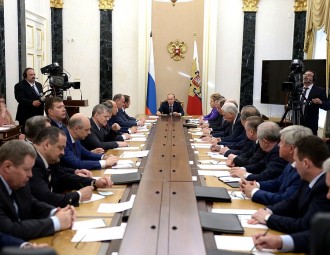Kremlin is using public diplomacy and pro-Kremlin NGOs to strengthen pro-Russian moods in Belarus
 kremlin.ru
kremlin.ru
Besides, Russian ideologists intensified their propaganda activity in Belarus: having no strong pro-Russian alternative in Belarus, Russia regards Lukashenka as the guarantor of the Russian footprint.
Next week in Moscow, Belarusian politicians and public figures, scientists and experts will take part in the international conference "BeloRussian dialogue”.
Russian ideologists specialising on Belarus have launched an aggressive campaign in the Russian media in an attempt to influence public opinion in Russia regarding ongoing processes in Belarus. While doing so, they have attempted to use the same mechanisms and ideological myths about Belarusians, which were used to mobilize pro-Kremlin patriotic electorate during the antic-Kyiv propaganda campaign.
Marginal Russian propaganda information resources have long exploited the theme of growth of ‘nationalistic trends in Belarus in recent years’. Leading Russian media frequently pointed to the Russian audiences that the interest in national symbols, culture and history had strengthened in Belarus.
While habitually criticizing the Belarusian "pro-Western" opposition, Russian media propaganda has focused on the fact that the Belarusian authorities and their opponents had allied in promoting national features. Russian propagandists not only have criticised the Belarusian authorities’ ‘Belarusization’ initiatives, but also some of the country’s senior officials – mostly Belarusian pro-Western Foreign Minister Uladzimir Makei. Meanwhile, they regard Lukashenka as the guarantor of Belarus remaining in the orbit of the ‘Russian world’.
In all odds, pro-Kremlin ideologues specializing on Belarus, are counting on strengthening their positions during the redistribution of resources from the sequestered Russian budget. Interestingly, many ideas used by the Russian media to describe the rise of ‘nationalistic trends’ in Belarus were presented as a research paper in October 2015 at the international conference "Russophobia and the information war against Russia”, held in Moscow with the support of the "People’s Diplomacy", a Russian Foundation for the development of civil society institutions. That said, the research paper accused the "old" groups of the Russian cultural policy failure and proposed to dismiss them and hire a new squad from the “People’s Diplomacy”.
In the same month, the research paper was disseminated at the 5th International Forum "Leader of the XXI century" in Minsk, which was attended by Shevtsov, an MP and Chechukevich, First Secretary of the Minsk Committee of the Youth Union.
Some pro-Kremlin initiatives in Belarus have already developed an ideological justification why Belarus belonged to the "Russian world" and gained supporters. Nevertheless, until now Moscow was unable to build a serious pro-Russian political movement in Belarus. Top Belarusian officials have prevented this from happening so as they aspire to continue negotiating with the Kremlin elite directly.
Nevertheless, Russia is likely to review her cultural policy vis-à-vis Belarus (and other CIS countries too), but the shape of the new policy will depend on who wins the internal struggle in Russia. For instance, the "old" Kremlin groups are attempting to expand contacts with independent Belarusian civil society and the opposition. Many prominent opposition politicians and experts were invited to the international conference "BeloRussian Dialogue" in Moscow. Among others, the event will be attended by the highest ranking opposition politician and former presidential candidate Tatsiana Karatkevich, economist and former presidential candidate in 2010 Yaraslau Ramanchuk, and other representatives of the independent media and NGOs.
In the near future, the Kremlin is unlikely to launch the "information war" against Minsk officials and President Lukashenka. However, the Belarusian leadership will zealously monitor and curb any attempts by the Kremlin to create alternative pro-Russian centres in Belarus.
-
03.01
-
07.10
-
22.09
-
17.08
-
12.08
-
30.09








































